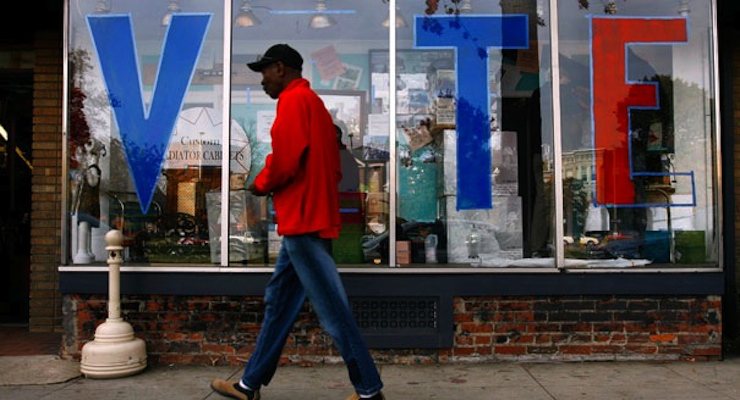

A customer walks past a store in front of them painting on the word “vote” (Photo: AP)
The students at Miami Central Senior High frustrated me, and I frustrated them. The topic was Ferguson and my opinion that African-Americans in that torn-up Missouri city could get the city government they want if only they voted in greater numbers. After all, they are a clear majority of the population.
“It isn’t as simple as you made it seem,” T’mya wrote. For one thing, African-Americans in Ferguson “move a lot so they would have to change their address and register.”
Ninth-grader Asia noted that “strict ID laws to vote make it also not easy for them to vote.”
And Jose cited limits to early voting. “Certain politicians have made sure it’s as inconvenient as possible” for the working poor to vote, he said.
I stand partly corrected. Voting is not so simple for many poor people as I seemed to imply. But I do worry that portraying inconveniences as high barriers can discourage people from even trying. Inconveniences can be worked around.
It’s obvious that Republicans are pushing rules that discourage poor populations — people who tend to vote for Democrats — from voting. And it’s no coincidence that enormous waits have occurred at polling places used by poor people and students, another largely Democratic voting bloc.
The problem comes in proving that the rules and long lines were intended to suppress the vote. Some cases are blatant, such as the Texas law requiring identification for casting a ballot that may include a concealed-handgun license but not a student ID or voter registration card.
Voter suppression usually hides in fuzziness. Consider the challenge to North Carolina’s voting law now before a federal court. Civil rights groups argue that by shortening the period for early voting, the 2013 law was intended to suppress the African-American vote.
That may well have been the intention, but try to prove it. North Carolina counters that the voting law changes apply to all. Furthermore, some states, such as New York, don’t allow early voting at all. No one is charging New York with suppressing anyone’s vote.
The Miami Central students correctly noted that poor people tend to move more often and have to register to vote with every change of address. True, but re-registering is necessary because politicians represent the people in their district.
Why don’t the students organize and urge new voting-age neighbors to register at their current address? Learn the valid forms of ID, and help those without one obtain what they need.
In central Florida, a group called Mi Familia Vota is greeting new arrivals from Puerto Rico at supermarkets and festivals and making sure they register.
Many have complained that Ferguson elects its city officials on a date far removed from the traditional Election Day. This complicates matters for many poor residents, Isaiah wrote, “because voting is not held at a time when black and low-income people are likely to show up.”
Isaiah is entirely right. But the immediate remedy would be to publicize the schedule and urge the people to show up. When they do so in large numbers, the date will be changed.
Tommie Pierson, pastor at the Greater St. Mark Family Church in St. Louis, said after a recent protest march, “If we’re going to change the system to work for us, we need to run for office and vote for ourselves.”
That cuts to the chase. And in the meantime, inconveniences aren’t mountains.






